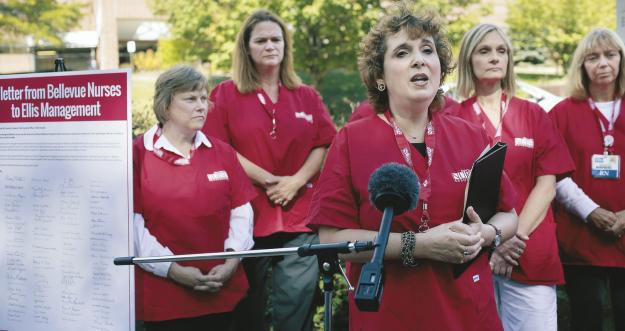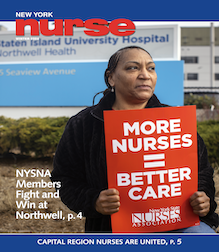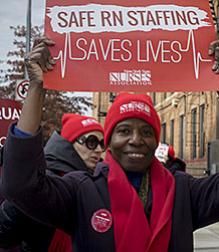
The nationwide trend of hospital consolidation has sparked controversy about the potential long-term effect on healthcare costs. Hospital consolidations are already having unexpected consequences in upstate New York, where 68 percent of all hospitals (outside of the New York City metropolitan area) are affiliated with at least one other hospital.
The fallout of system savings through greater economies of scale must be measured, though, not just in dollars but also in patient care. Cuts in services – and proposals for further cuts – are increasingly par for the course in upstate hospital systems, putting more and more New Yorkers at risk.
Service cuts
St. Joseph’s Hospital in Elmira, for instance, became part of Arnot Health in 2011, a system with three hospitals in New York’s Southern Tier. In August, plans became public that the hospital would shift acute and intensive care services to Arnot Ogden, another system hospital; 54 nurses lost their jobs as part of this transition.
In New York’s North Country, Adirondack Health has plans to replace the 24/7 Emergency Department (ED) at Adirondack Medical Center in Lake Placid with a part-time ED. Local residents and visitors (over 1 million each year) will be forced to go to another Adirondack Health hospital in Saranac Lake (17 miles away) for emergency service between 11 p.m. and 11 a.m.
Merger madness
New York is not alone in coping with the aftermath of consolidations. There have been more than 1,000 hospital mergers and acquisitions in the U.S. since 1994. The rate of consolidation deals is accelerating, with 50 in 2006 and 105 in 2012. There were 46 merger deals in the first seven months of this year, and the pace may well increase with the Affordable Care Act (ACA).
The ACA encourages consolidations of hospitals and physician practices under the premise that this will reduce healthcare costs. Savings will result, says the theory, from creating accountable care organizations and by shifting Medicare and Medicaid reimbursements from volume to value.
Hospitals also are facing financial pressure from reductions in federal reimbursements. Hospitals in our state will face sequestration-related Medicare cuts of more than $2 billion between 2013 and 2021, on top of more than $20 billion in other federal cuts over the next 10 years.
Meanwhile, many analysts fear that the end result of consolidations will likely be higher, rather than lower, healthcare costs. Increased consolidation will lead to less competition, which will grant healthcare systems greater leverage in negotiating rates with insurance companies. The combination of higher hospital charges and high deductible health insurance plans may well make it hard for even the insured to pay their medical bills, much less the uninsured.
Unsure future
The full effect on patients and hospitals is yet to be seen. As David Aker, CEO of Canton-Potsdam Hospital, which is acquiring E.J. Noble Hospital in Gouverneur, recently observed, “New York is 49th in the nation in terms of acute care hospital profitability, so we will not defy gravity forever.”
Not surprisingly, Canton-Potsdam won’t commit to keeping all services open in Gouverneur. Nurses are not waiting for bad news: We’re actively standing up with the community to make sure that the people of Gouverneur and the surrounding area have access to the care they need, when and where they need it.
On guard for care upstate
From the North Country to the Southern Tier, we are uniting to protect care in our communities:
In Plattsburgh, we’re fighting for a contract that guarantees safe RN and caregiver staffing levels.
In Gouverneur, we’ve joined with 1199SEIU to demand that all services stay open at E.J. Noble Hospital.
In Elmira, we’ve built a powerful coalition of neighbors and patients to speak out against the downgrading of services at St. Joseph’s Hospital.
Uniting for patient care
Almost every single RN at the Bellevue Woman’s Center in Niskayuna has signed a petition to management to recognize our new union – NYSNA.
Many Bellevue nurses are especially trained to care for newborns or mothers who have delivered by C-section. Management is re-assigning these skilled nurses to care for other kinds of patients – without the appropriate level of training or orientation, say nurses.
“We are very concerned that the changes management has made could compromise care for our patients – new mothers, women, and babies,” said Christine Walthers, registered nurse in the post-partum unit at Bellevue. “We need a say in patient care decisions in our hospital. That’s why we are joining the New York State Nurses Association.”
“I see nurses being forced to take on 10 patients at once. That is too many,” said Vickie Decker (left), a registered nurse for 24 years at Bellevue. “We’re on the front lines of the changes in healthcare. We’re looking forward to sitting down with Ellis Hospital management to discuss how we can work together to improve care for our patients.”




